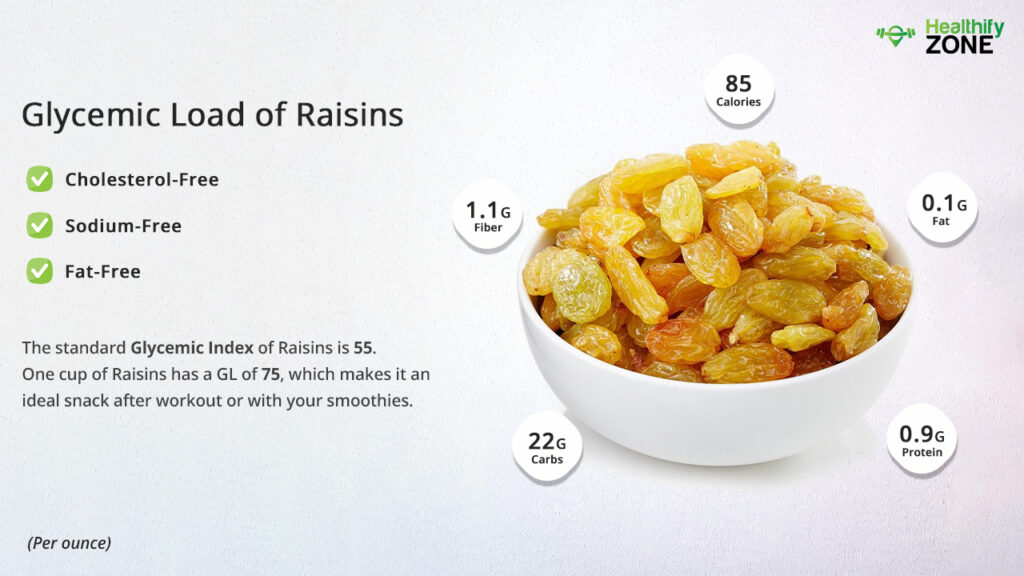The Glycemic Index of Raisins is 65. Raisins are nutrient- and calorie-dense because the drying process concentrates the nutrients and carbohydrates found in grapes. Prior to arriving in Europe, where they were particularly well-liked by the Greeks and Romans, raisins were originally developed in the Middle East. In the past, raisins were used as money, as prizes for sporting competitions, and as a remedy for illnesses like food poisoning.
Nowadays, raisins can be found in most shops. The drying method employed can affect the color of the raisins. Red and brown raisins are preferred as snacks, whereas golden yellow raisins are frequently incorporated into baked items.
Raisins are a lightly processed, naturally preserved food high in nutrients. However, they should only be consumed in moderation because they are also high in calories and sugar.

Are Raisins Safe for Diabetes?
Despite having diabetes, you can consume raisins. Of course, this does not imply that you should constantly eat boxes and boxes of raisins. As with other fruits, raisins are a form of food that naturally contains sugar. So, even though raisins are safe to eat, moderation is essential to avoid a blood sugar increase. Remember that fruit includes carbohydrates despite being nutritious. To avoid consuming too many servings of carbohydrates, you should count fruit as part of your meal even if you are eating it as a snack. 2 tablespoons (tbsp) of raisins typically have 15 grams (g) of carbs in them.
Are Raisins Suitable for Weight Loss?
Yes, raisins are suitable for weight loss. Dietary fibers are abundant in Kismis. A diet rich in fiber prevents overeating by keeping you full for longer. The natural sugars glucose and fructose found in raisins are turned into energy by the body’s chemical processes. Additionally, raisins contain some calcium. These natural sugars and calcium boost your exercise regimen by giving you energy for your workouts.
Leptin, also known as a fat-burning hormone, is present in raisins. Additionally, the body’s elevated leptin levels reduce food cravings. Antioxidants like phenols and polyphenols are prevalent in raisins. According to studies, these antioxidants promote fat breakdown, lower caloric intake, and raise the number of beneficial bacteria in the stomach that promote digestion.
Free radicals are also eliminated from the body by antioxidants. Numerous fatal diseases, including cancer, stroke, and cardiovascular conditions, can be caused by free radicals. Consequently, a diet high in antioxidants can shield your body from a number of common ailments.
Due to their soothing and cough-suppressing effects on dry cough and irritation of the respiratory system, Munakkas are highly helpful. Additionally, raisins have a high vitamin B and C content, raising immunity and protecting you from seasonal infections. Your weight loss plan works best when you are healthy and exercise frequently.
What is the Best time to Consume Raisins?
When raisins are consumed after being soaked, it matters a lot. Because of this, eating them first thing in the morning is preferable. The raisins don’t need to be soaked for more than, say, 5 or 6 hours. When soaked in water, raisins work as natural laxatives because they are high in fiber. As a result, consuming soaked raisins helps avoid constipation and regulates your digestive system all day long. Raisins are a terrific way to satisfy your sweet tooth without consuming a lot of extra calories because they are packed with natural sugars. However, don’t overdo it and consume them in moderation. They aid blood sugar regulation, curb cravings, and support your weight loss objectives.
The Bottom Line: The Glycemic Index of Raisins is 65.
Raisins are low in calories and incredibly nutrient-dense. Nutrient-rich raisins are sun-dried grapes without seeds. 120 calories, 2 grams of dietary fiber, 298 milligrams of potassium, and 25 mg of calcium may be found in a quarter cup of raisins. Vitamin B6, riboflavin, and thiamine, vital health elements, are abundant in this dried fruit. Dietary fiber, which is abundant in raisins and helps control blood sugar levels. Due to the high fiber content, you stop mindless eating and feel full for longer. Additionally, it controls the glycemic response after meals. Raisins can raise the risk of kidney stones, despite being well-tolerated. You should therefore be careful not to eat too much beet. Raisins may cause your pee to turn pink or scarlet, leading you to believe it is blood in your urine.